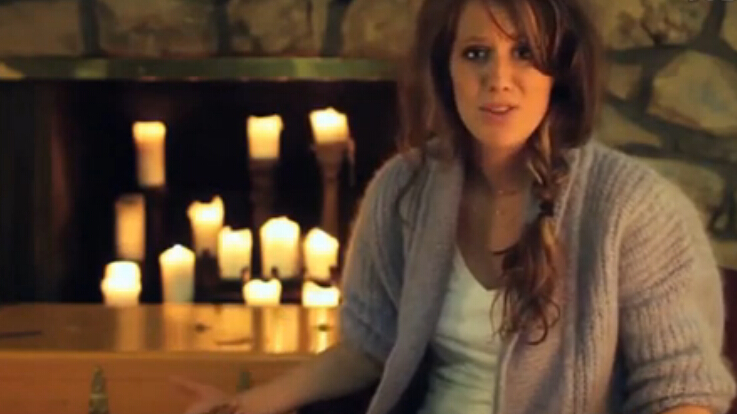How to Ask Good Questions
學會提出好問題,萬人迷就是你!
How Do I Ask Good Questions?
我要怎樣問出好問題?
Hello, and welcome to the Ask Joy fireside chat. Here we are with our blazing flames and just a few close friends. (Actually, it's just me and the cameraman.) But this question was written in by someone in response to a three-part series that I had done on the "Art of Asking Questions." And this person just said, "Hey, can you give us some tangible questions to actually ask?" So, I will do that because that's such a great question.
哈嘍,歡迎來到《請問 Joy 大大》 爐邊閑話。我們在這和我們明亮的光芒以及幾個親近的朋友一起。(事實上,只有我和攝影師。) 但這個問題是某位寫來,回覆我在《問問題的藝術》做過的三部曲系列。這個人就說:“嘿,你可以提供我們一些明確的問題去真的發問嗎?”所以我會提供,因為那真是個好問題。
Let's pretend you're at a party. This is how you do it.
我們來假裝你在一場派對上。這是你怎么做的。
"Hi, what's your name?"
“嗨,你叫什么名字?”
"Are you in school?"
“你在上學嗎?”

"Where did you grow up?"
“你在哪長大的啊?”
"Tell me about your family."
“跟我聊聊你的家人。”
"Come here often?"
“常來這嗎?”
And that's how it's done. Thanks for writing in.
就是要這樣做。謝謝來信。
No—this isn't rocket science. Those are basic stock questions that I know you know how to ask—I know how to ask—but the difficult thing for you and me is listening to the answer. So when you're at a party and you are...you know, see Bill and you're like "Hey, Bill." And you wanna ask him some questions; ask him, you know, "What do you do?" "What are your hobbies?" or whatever, and then pay attention to what he gets excited about. Listen to the verbal answer, but also the non-verbal answer.
不--這不是火箭科學那么困難的事。那些是我知道你知道該怎么問的基本慣用問題--我就知道怎么問--但對你我來說難的事是“傾聽回答”。所以當你在派對然后你...你知道,看到 Bill 然后你就像“嘿,Bill”那樣。你想問他一些問題;問他啊,你知道的,“你是做什么的?”“你的嗜好是什么?”還是什么的,然后注意他對什么感到興奮。傾聽語言回答,還有非語言回答。
What does he get...you know, and so if he's like, "I, you know, I really love climbing trees blindfolded." Wow—you know, sometimes we can go, "Well, I don't like climbing blind trees folded." What?
他對什么感到...你知道,所以如果他像這樣:“我,你知道,我真的很愛蒙眼爬樹。”哇--你知道,有時候我們會說:“嗯,我不喜歡對折爬瞎樹。”瞎米?
I don't like climbing trees blindfolded, so I guess Bill and I don't have anything kinda in common. Guess I'll get back to the punch bowl. No—you go, Wow, this is something really unique about Bill, and take the time to go, Okay, if he's excited about this, I wanna learn more. Be inquisitive.
我不喜歡蒙眼爬樹,所以我猜 Bill 和我毫無半點共同處。我想我得回去找調酒大碗公了。不--你要想:哇,這真是件關于 Bill 很獨特的事耶,然后花時間去想:好吧,如果他對這感到興奮,那我想要知道更多。要有好奇心。
I don't know if it's our social media and being able to say what we're doing and how we're feeling all the time, but I think we've kind of lost the ability to go, wonder what this person's thinking, wonder what they're, you know, passionate about, so pay attention to that. And then compare it to yourself and go, Wow, I don't have a passion for blindfolded tree climbing, you know, or I don't even have the ability to do what Bill does. And just pay them a compliment, honor them, just because it's a nice thing to do—you know, when someone is taking the time to say something nice to you. I think we have this fear of doing this.
我不知道是不是因為我們的社群媒體還有能夠無時無刻說我們在做什么,以及無時無刻說我們感覺如何的關系,但我覺得我們已經有點喪失能力去好奇:不知道這個人在想什么、不知道他們對什么有熱忱,所以留意那資訊。然后將那和自己相比并思考:哇,我對蒙眼爬樹沒有熱情,你知道,或是我根本沒辦法做 Bill 做的事。就給他們一個讚美、尊崇他們,只因為這是件很好的事--你知道,在有人花時間對你說些好話時。我覺得我們有給人讚美的這種恐懼。
"What messages are we gonna send people?" No—get over that and just do it! And then even more, what I love is, like, if I'm talking with somebody, and then somebody else comes up, and the person that I've been talking to says to that person, "Hey, did you know that Joy's been doing this, this, and this?" I mean, that makes you feel so cool.
“我們會傳達給人什么訊息?”不--克服那恐懼然后做就對了!更甚至,我愛的事是,像如果我在和某人說話,然后其他人出現了,而在和我說話的人告訴那個人:“嘿,你知道 Joy 在做這個、這個還有這個嗎?”我是說,那讓你覺得很酷。
And so, I wanna make a practice of engaging anybody in that way, where I listen to them, I pay attention to what excites them, I honor them, and then I honor them publicly. If we can't do that in our regular friendships, then when we're in the day-in and day-out of marriage and you just get used to somebody, it's really gonna be difficult for us to stop, ask questions, listen to their answers, pay attention to their dreams and the things that they get excited about, and then honor them—privately and publicly. This is a practice we need to do now because I do believe it'll affect our marriage.
所以我想要想要養成一個和任何人都以那種方式交談的習慣,我會傾聽他們、我留意什么使他們興奮、我尊崇他們,然后我公開對他們表示敬意。如果我們沒辦法在我們日常的友誼中做到那,那么當我們在婚姻的日復一日里時,你就習慣了某人,對我們來說會很難去停下來、去提出問題、傾聽他們的回答、注意他們的夢想還有他們感到興奮的事物,然后尊崇他們--私下還有公開地。這是一個我們現在就要養成的習慣,因為我相信這將會影響我們的婚姻。
So, I know I've really stretched that out of, like, "How do I ask quetions at a party?" to, like, projecting onto your marriage. But as you can tell, this is something I get passionate about. So, I appreciate you asking the question and good luck at the next party with Bill, the tree climber.
所以,我知道我真的從那延伸很遠,像是,“我怎么在派對上問問題?”到像是,投射到你的婚姻上。但如你能發現的,這是一件我熱衷的事。所以,我很感謝你問那問題,然后祝你下次派對上和 Bill,那個爬樹的人,一切順利蘿。
On the next Ask Joy, Joy finally attains full creeper status.
在下一次《請問 Joy 大大》中,Joy 終于到達怪咖狀態。
Just go to a party, ask her what she does, see what she gets excited about—squirrels, treats, whatever...
就去派對,問她她是做什么的,看看她對什么感到興奮--松鼠啊、糖果餅干啊、隨便什么的...
...fleas.
...跳蚤啊。











